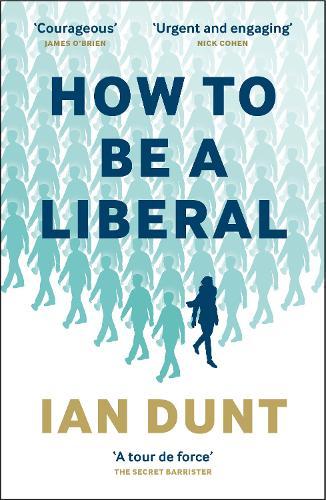Full Product Details
Author: Ian Dunt
Publisher: Canbury Press
Imprint: Canbury Press
Dimensions:
Width: 12.90cm
, Height: 3.50cm
, Length: 19.80cm
ISBN: 9781912454457
ISBN 10: 1912454459
Pages: 480
Publication Date: 02 September 2021
Audience:
General/trade
,
College/higher education
,
Professional and scholarly
,
General
,
Tertiary & Higher Education
Format: Paperback
Publisher's Status: Active
Availability: Available To Order

We have confirmation that this item is in stock with the supplier. It will be ordered in for you and dispatched immediately.
Reviews
'A tour de force; a mighty trumpet blast for the forces of liberalism and enlightenment in the face of a global tide of ignorance and populism.' - THE SECRET BARRISTER 'This is a history of ideas as it should be written - brilliant, vivid story-telling about the people who shaped liberalism, the challenges it has faced over the centuries, its commitment to the truth and why it's now more important than ever to defend it.' - CAROLINE LUCAS MP 'Dunt's gift for making complicated issues comprehensible is second to none. Courageous.' - JAMES O'BRIEN, LBC 'How To Be A Liberal is required reading for today's political debates.' - ANNE APPLEBAUM, TWILIGHT OF DEMOCRACY 'Clear-eyed and hard-headed. His defence of liberalism is political writing at its most urgent and engaging.' - NICK COHEN, OBSERVER COLUMNIST 'A phenomenal history from a truly big mind.' - DAVID SCHNEIDER, THE DEATH OF STALIN 'In an age of rampant nationalism and anti-intellectualism, this book urges us to celebrate complexity and diversity. Dunt, editor of the website politics.co.uk, counterposes liberalism and nationalism, the latter of which, he writes, is based on a sixfold lie. Among its elements are the thought that we can have only one identity at a time, which makes us part of the mass: an undifferentiated component of the whole, and the contention that any difference from that mass is bad. We see the sixth component, there is no such thing as truth, enacted with every Trump tweet. As Orwell knew, when politicians can get away with lies, lie they will; if the concepts of truth and falsehood disappear, then they will do as they please. Having established this sixfold premise, Dunt examines the evolution of the idea of liberalism, at least some of which he traces back to Descartes and his obsession with the gap between dream and reality, the thin line between being awake and...the crazed world of dreaming -i.e., the foundational stuff of truth and lies. While Descartes is seldom pressed into political work, Dunt makes a good case for doing so. Other figures in the battle against authoritarianism include some of the usual suspects, such as John Locke and John Stuart Mill-who was careful to give credit to his partner, Harriet Taylor, a woman who even so was erased from the historical record. The paucity of intellectualism on the far right, an ideology pumped into the heart and pursued with the fist, is as evident now as it was a century ago. In a book that makes a good companion to Adam Gopnik's A Thousand Small Sanities, Dunt takes down a few politically correct absurdities, but most of his fire is aimed squarely at Trump, Theresa May, Marine Le Pen, and other enemies of freedom. When in the course of human events it falls on us to resist, this makes a welcome guidebook.' - KIRKUS, https://www.kirkusreviews.com/book-reviews/ian-dunt/how-to-be-a-liberal/ 'A journalist who has come to prominence on Twitter as a staunch critic of Brexit, Dunt has delved into heavy academic theory and interpreted it in an accessible manner for the ordinary reader. He describes liberalism as an enormous, boisterous, confounding bloody thing, and writes passionately in its favour, as a counterweight to ignorance and populism. This book is required reading for anyone interested in politics and philosophy.' - PROSPECT 'All of Ian Dunt's How to be a Liberal is essential reading, but the chapter on Harriet Taylor and John Stuart Mill is blistering, eye-opening stuff.' - Shakespeare & Company bookstore, https://twitter.com/Shakespeare_Co/status/1332266783303151617
‘A tour de force; a mighty trumpet blast for the forces of liberalism and enlightenment in the face of a global tide of ignorance and populism.’ – THE SECRET BARRISTER ‘This is a history of ideas as it should be written – brilliant, vivid story-telling about the people who shaped liberalism, the challenges it has faced over the centuries, its commitment to the truth and why it’s now more important than ever to defend it.’ – CAROLINE LUCAS MP ‘Dunt’s gift for making complicated issues comprehensible is second to none. Courageous.’ – JAMES O’BRIEN, LBC ‘How To Be A Liberal is required reading for today’s political debates.’ – ANNE APPLEBAUM, TWILIGHT OF DEMOCRACY ‘Clear-eyed and hard-headed. His defence of liberalism is political writing at its most urgent and engaging.’ – NICK COHEN, OBSERVER COLUMNIST ‘A phenomenal history from a truly big mind.’ – DAVID SCHNEIDER, THE DEATH OF STALIN 'When in the course of human events it falls on us to resist, this makes a welcome guidebook.' – KIRKUS 'He describes liberalism as “an enormous, boisterous, confounding bloody thing,” and writes passionately in its favour, as a counterweight to ignorance and populism. This book is required reading for anyone interested in politics and philosophy.' – PROSPECT 'All of Ian Dunt’s How to be a Liberal is essential reading, but the chapter on Harriet Taylor and John Stuart Mill is blistering, eye-opening stuff.' – Shakespeare & Company bookstore, https://twitter.com/Shakespeare_Co/status/1332266783303151617
Author Information
About the Author Ian Dunt is a columnist with the I newspaper and presents the Origin Story and Oh God, What Now? podcasts. His first book, Brexit: What the Hell Happens Now? (Canbury Press, 2017) on Britain's departure from the European Union was a bestseller. In How Westminster Works (And Why It Doesn't) he looked at the UK politics. In How To Be A Liberal (Canbury, 2020) he tells the story of our personal freedom. Drawing on history, politics and economics, he argues for a radical, egalitarian liberalism that nurtures both individuals and us all.




